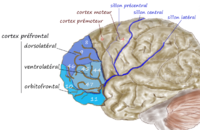
Photo from wikipedia
This review aims to identify whether risky decision-making is increased in substance users, and the impact of substance type, polysubstance use status, abstinence period, and treatment status on risky decision-making.… Click to show full abstract
This review aims to identify whether risky decision-making is increased in substance users, and the impact of substance type, polysubstance use status, abstinence period, and treatment status on risky decision-making. A literature search with no date restrictions was conducted to identify case-control studies or cross-sectional studies that used behavioral tasks to measure risky decision-making in substance users. A random-effects model was performed. GRADE criteria was used to assess the quality of evidence. 52 studies were enrolled. The result showed that the difference in risky decision-making performance between user groups and control groups was significant (SMD = − 0.590; 95%CI = − 0.849 to − 0.330; p < 0.001; I2 = 93.4%; Pheterogeneity < 0.001). Subgroup analysis showed that users in the subgroups of alcohol (p < 0.001), tobacco (p < 0.01), cocaine (p < 0.001), opioid (p < 0.001), mixed group (p < 0.01), adult users (p < 0.001), small sample size (p < 0.001), large sample size (p < 0.01), low education (p < 0.001), high education (p < 0.001), short-abstinence period (p < 0.001), long-abstinence period (p < 0.001), without current polysubstance dependence (p < 0.001), and with treatment (p < 0.001) had increased risky decision-making when compared to the controls. On the other hand, elderly substance users with short-abstinence period showed increased risky decision-making. Moreover, current treatment status and polysubstance use may not influence the level of decision-making in substance users. The results show that substance use is associated with impaired risky decision-making, indicating that interventions targeting risky decision-making in substance users should be developed for relapse prevention and rehabilitation.
Journal Title: Psychopharmacology
Year Published: 2020
Link to full text (if available)
Share on Social Media: Sign Up to like & get
recommendations!